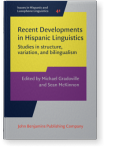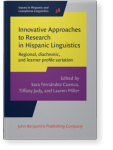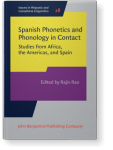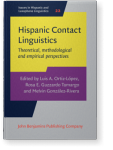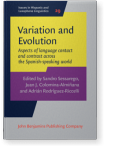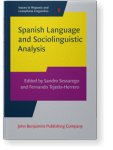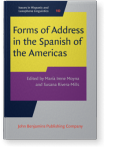Jim Michnowicz
List of John Benjamins publications for which Jim Michnowicz plays a role.
2024 Chapter 7. Ven, Vení, Venga: Forms of address among Argentines and Central Americans in North Carolina Recent Developments in Hispanic Linguistics: Studies in structure, variation, and bilingualism, Gradoville, Michael and Sean McKinnon (eds.), pp. 172–196 | Chapter
The present investigation contributes to our understanding of the evolving linguistic communities in the Southeastern U.S. by examining the factors that drive speakers’ choice of second person singular pronouns (e.g., tú, vos, usted). Results indicate that context and origin are the most… read more
2023 Chapter 6. Real and apparent (time) changes in Yucatan Spanish: The case of /bdg/ Innovative Approaches to Research in Hispanic Linguistics: Regional, diachronic, and learner profile variation, Fernández Cuenca, Sara, Tiffany Judy and Lauren Miller (eds.), pp. 130–151 | Chapter
Yucatan Spanish (YS) is a regional dialect that shows a variety of language contact features due to sustained close contact with an indigenous language, Yucatec Maya. Previous research has indicated that YS is undergoing rapid standardization toward Central Mexican norms for a variety of… read more
2023 Perceptions of inclusive language in the Spanish of the Southeast: Data from a large classroom project Spanish in Context 20:1, pp. 96–129 | Article
This study examines the perceptions of inclusive language among first- and second-generation Spanish speakers residing in North Carolina, USA, based on survey data collected from 337 speakers by undergraduates. The survey examines familiarity with innovative inclusive language forms (including… read more
2020 Chapter 2. The changing rhythm of Yucatan Spanish Spanish Phonetics and Phonology in Contact: Studies from Africa, the Americas, and Spain, Rao, Rajiv (ed.), pp. 35–62 | Chapter
This is a real time sociolinguistic analysis of the changing rhythm of Yucatan Spanish (YS), measured by four rhythm metrics: %V, ΔC, Vnpvi and Crpvi. We compare apparent time data, previously collected in 2005, with real time data collected 11 years later, in 2016, analyzing the prosodic rhythm… read more
2020 Chapter 5. The acento pujado in Yucatan Spanish: Prosodic rhythm and the search for the yucateco accent Hispanic Contact Linguistics: Theoretical, methodological and empirical perspectives, Ortiz López, Luis A., Rosa E. Guzzardo Tamargo and Melvin González-Rivera (eds.), pp. 115–136 | Chapter
Previous research has indicated that the accent of Yucatan Spanish (YS) differs from that of other dialects, in particular standard Mexican Spanish from central Mexico. These studies attribute the YS accent, described as halting/staccato (pujado), to contact with Yucatec Maya, suggesting that… read more
2020 Chapter 7. Sheísmo in Montevideo Spanish: Not (yet) identical to Buenos Aires Variation and Evolution: Aspects of language contact and contrast across the Spanish-speaking world, Sessarego, Sandro, Juan J. Colomina-Almiñana and Adrián Rodríguez-Riccelli (eds.), pp. 163–186 | Chapter
Studies have documented an ongoing change from /ʒ/ to /ʃ/ in Rioplatense Spanish, and research indicates that the change to /ʃ/ is complete for young speakers of Buenos Aires (BA) Spanish. However, sheísmo in the neighboring country of Uruguay has not been thoroughly studied. The present study… read more
2020 Examining the (mini-) variable swarm in the Spanish of the Southeast Hispanic Linguistics: Current issues and new directions, Morales-Front, Alfonso, Michael J. Ferreira, Ronald P. Leow and Cristina Sanz (eds.), pp. 303–326 | Chapter
The present investigation aims to facilitate our understanding of Spanish in the Southeastern United States – a region that despite its rapid growth over the last two decades, has received little attention in the literature. Analyses of four linguistic variables indicated that while second… read more
2016 On glottal stops in Yucatan Spanish: Language contact and dialect standardization Spanish Language and Sociolinguistic Analysis, Sessarego, Sandro and Fernando Tejedo-Herrero (eds.), pp. 219–240 | Article
This article examines the impact of linguistic and extra-linguistic factors on the production of glottalization (/ʔ/ and creaky voice) in Yucatan Spanish. The results of this study suggest that glottal insertion before vowel-initial words in Yucatan Spanish is the product of language contact… read more
2016 The changing system of Costa Rican pronouns of address: Tuteo, voseo, and ustedeo Forms of Address in the Spanish of the Americas, Moyna, María Irene and Susana Rivera-Mills (eds.), pp. 243–266 | Article
This study examines the reported use of three forms of address (tú, vos, usted) in Costa Rican Spanish. Previous studies indicate three phenomena of interest: (1) Usted is used with [+solidarity] interlocutors; (2) While tuteo has been historically absent, some studies suggest an increase in tuteo… read more
2013 Voiceless stop aspiration in Yucatan Spanish: A sociolinguistic analysis Spanish in Context 10:3, pp. 410–437 | Article
Previous research has indicated that in Yucatan Spanish, /ptk/ are aspirated at greater levels than in other varieties, a feature attributed to contact with Yucatec Maya, a language that has both aspirated and ejective voiceless stops. The current study presents the first quantitative, acoustic,… read more
2008 Final nasal variation in Merida, Yucatan Spanish in Context 5:2, pp. 278–303 | Article
This article investigates the linguistic and social constraints on final nasal variation in Yucatan Spanish (YS), based on data collected in Merida, Yucatan. Absolute final nasals in YS may surface variably as: [n], [ŋ], ø or [m] (e.g. pan → [pám], ‘bread’). The results reveal a distribution of… read more
2006 Final -m in Yucatan Spanish: A Rapid and Anonymous Survey New Perspectives on Romance Linguistics: Vol. II: Phonetics, Phonology and Dialectology, Montreuil, Jean-Pierre Y. (ed.), pp. 155–165 | Article
Previous studies report that final nasals often labialize to [m] in Yucatan Spanish. The present study details a rapid and anonymous survey undertaken to explore the change [n] > [m] in this dialect. The researcher walked along Avenida Coln in Merida, Mexico, and asked passers-by the name of the… read more
